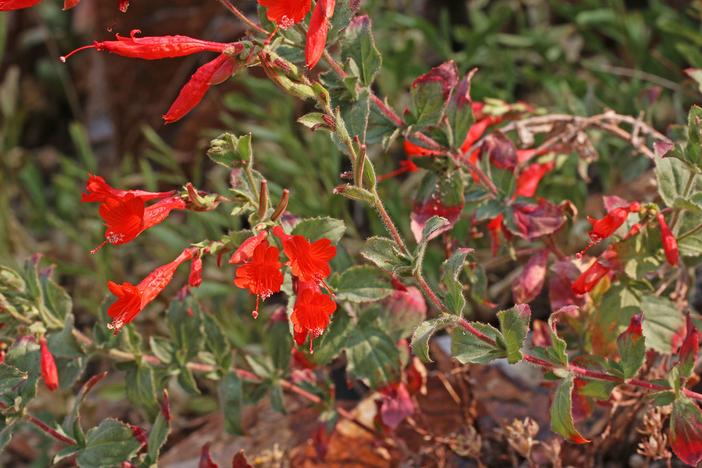Garrett’s Firechalice
(Zauschneria garrettii)
Garrett’s Firechalice (Zauschneria garrettii)
/
/

Andrey Zharkikh
CC BY 2.0
Image By:
Andrey Zharkikh
Recorded By:
Copyright:
CC BY 2.0
Copyright Notice:
Photo by: Andrey Zharkikh | License Type: CC BY 2.0 | License URL: https://creativecommons.org/licenses/by/2.0/ | Uploader: AndreyZharkikh | Publisher: Flickr



























Estimated Native Range
Summary
Zauschneria garrettii, commonly known as Garrett’s Firechalice, is a deciduous perennial herb native to the open woodlands, chaparral, and scrublands of the Southwestern USA, particularly in Utah and surrounding areas. It typically grows to a height of 0.3-0.5 feet (0.09-0.15 meters) and spreads 0.7-1 feet (0.2-0.3 meters). This plant is characterized by its tubular red flowers that bloom profusely from late summer to early winter, adding vibrant color to the garden when many other plants have ceased blooming.
Garrett’s Firechalice is valued for its drought tolerance and ability to attract hummingbirds and other pollinators with its showy flowers. It is often used in xeriscaping, rock gardens, and native plant landscapes. It thrives in full sun to part shade and requires well-drained soils, preferably with a sandy or gravelly composition. While it is low-maintenance and adapted to arid conditions, it can benefit from occasional deep watering during prolonged dry spells. It is not commonly affected by diseases but can be susceptible to root rot if overwatered or planted in poorly drained soils.CC BY-SA 4.0
Garrett’s Firechalice is valued for its drought tolerance and ability to attract hummingbirds and other pollinators with its showy flowers. It is often used in xeriscaping, rock gardens, and native plant landscapes. It thrives in full sun to part shade and requires well-drained soils, preferably with a sandy or gravelly composition. While it is low-maintenance and adapted to arid conditions, it can benefit from occasional deep watering during prolonged dry spells. It is not commonly affected by diseases but can be susceptible to root rot if overwatered or planted in poorly drained soils.CC BY-SA 4.0
Plant Description
- Plant Type: Herb
- Height: 0.3-0.5 feet
- Width: 0.7-1 feet
- Growth Rate: Moderate
- Flower Color: Red, Orange
- Flowering Season: Summer, Fall
- Leaf Retention: Deciduous
Growth Requirements
- Sun: Full Sun, Part Shade
- Water: Low
- Drainage: Medium, Fast
Common Uses
Bee Garden, Bird Garden, Butterfly Garden, Deer Resistant, Drought Tolerant, Erosion Control, Fire Resistant, Fragrant, Hummingbird Garden, Low Maintenance, Rock Garden, Street Planting
Natural Habitat
Open woodlands, chaparral, and scrublands of the Southwestern USA, particularly in Utah and surrounding areas
Other Names
Common Names:
Scientific Names: , Zauschneria garrettii, Epilobium canum subsp. garrettii, Epilobium canum var. garrettii, Zauschneria latifolia var. garrettii,
GBIF Accepted Name: Epilobium canum subsp. garrettii (A.Nelson) P.H.Raven